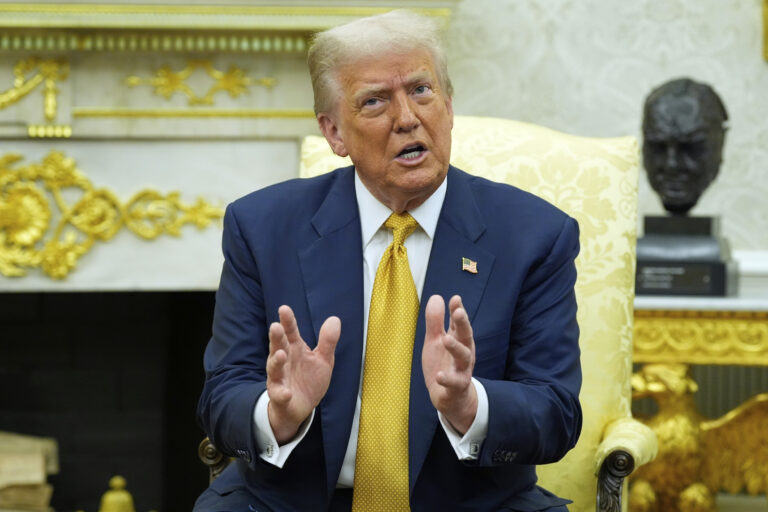Kremlin spokesman Dmitry Peskov said Thursday that the BRICS alliance does not respond to threats and does not target its efforts against other countries, following President Donald Trump’s announcement of new tariffs on several BRICS nations.
“That is not the purpose of BRICS,” Peskov told Russian state news agency Tass.
Peskov said the bloc, comprised of Brazil, Russia, India, China and South Africa, was founded to foster cooperation among emerging economies, not to confront or oppose other states.
“The purpose of BRICS is to develop cooperation in areas of mutual interest for mutual benefit,” he added.
Why It Matters
Certain tariffs are set to go into effect at Trump’s orders on August 1, following months of threats, negotiations, and pushback from other nations. Trump argues that these are necessary to restore U.S. manufacturing and stop the country from being exploited by trading partners; however, economists and lawmakers have warned that it will be Americans who pay the cost.

Associated Press
What to Know About Trump’s Tariffs Deadline
Trump signed an executive order earlier this week imposing new tariffs on imports from BRICS nations. Beginning August 1, a 25 percent tariff will apply to Indian goods entering the United States, while Brazilian imports will face a 50 percent tariff increase.
Trump initially unveiled sweeping import taxes on goods coming into the U.S. from nearly every country in April, sending global markets into a panic. Most of the tariffs have since been postponed twice, allowing time for bilateral negotiations.
In early July, Trump began sending out letters telling countries that higher tariffs would be imposed on dozens of them on August 1 unless they struck new deals with the U.S. Several trading partners, including South Korea, the United Kingdom, the European Union, Vietnam, Indonesia, the Philippines and Japan, have now struck deals, with some in just the past few days.
Who Pays Tariffs?
The Trump administration has repeatedly stated that foreign companies, and therefore the countries they represent, will bear the tariffs and absorb the costs.
Opponents and several economists have argued that it will be the American consumer who pays the price, with companies passing on the costs through higher prices.
On Tuesday, the Washington Center for Equitable Growth said that tariffs would no doubt have an impact on U.S. manufacturers, stating that while some industries may see a revival, others could be squeezed by sudden jumps in the cost of raw materials.
Are Donald Trump’s Tariffs Legal?
The president does have the power to impose tariffs, but as during his first term in the White House, Trump is facing legal challenges over whether or not he should have consulted Congress on the matter.
On Thursday, a day before the current deadline, an appeals court in Washington, D.C., was hearing arguments over whether Trump had overreached his executive powers by imposing reciprocal tariffs, with business leaders among those challenging the move.
What Countries Are Part of BRICS?
BRICS is an intergovernmental organization, similar to other groups such as the European Union or G7, which aims to enhance economic cooperation among member nations and global trading partners.
Its member states as of July 2025 are:
BrazilRussiaIndiaChinaSouth AfricaSaudi ArabiaEgyptEthiopiaIranUnited Arab EmiratesIndonesia
What People Are Saying
President Donald Trump, on Truth Social: “If our Country was not able to protect itself by using TARIFFS AGAINST TARIFFS, WE WOULD BE ‘DEAD,’ WITH NO CHANCE OF SURVIVAL OR SUCCESS. Thank you for your attention to this matter!”
India’s Ministry of Commerce and Industry, in response to Trump’s earlier announcement of a 25 percent tariff: “The government has taken note of a statement by the U.S. President on bilateral trade. The government is studying its implications. India and the US have been engaged in negotiations on concluding a fair, balanced and mutually beneficial bilateral trade agreement over the last few months. We remain committed to that objective.”
Pinelopi Goldberg, a former chief economist at the World Bank, previously told Newsweek: “If tariffs settle in the 15–20-percent range, I would not expect dramatic near-term effects on the U.S. economy. That said, there is a significant political cost—especially as many of these tariffs target long-standing U.S. allies. The implications of that cost will likely become evident over the longer term.”
What Happens Next
The new tariffs are set to go into effect on August 1, pending any last-minute trade deals.
Update 7/31/25, 1 p.m. ET: This article was updated with additional information.


